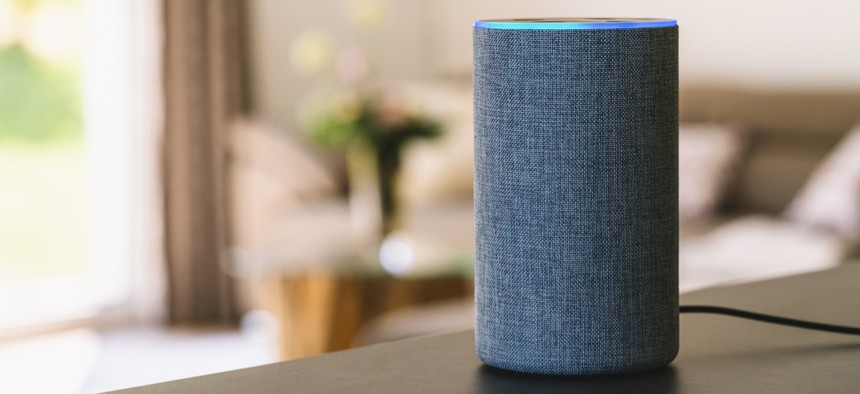Questions About City Services? In These Places, Turn to Alexa.

In cities across the country, Alexa can answer questions about government meetings, trash pick-ups and building hours, among other things. r.classen/Shutterstock
Increasing numbers of state and local governments are allowing residents to query Amazon's Alexa for information about services and sometimes even make requests.
Got a question about city council meetings, public pool hours or trash pick-up? In more and more cities, Alexa has the answer.
Across the country, dozens of state and local governments are harnessing the power of Alexa, Amazon’s silky-voiced digital assistant, to field queries from residents. The technology, available to the roughly 40 million Americans who own an Amazon smart speaker, is tailored to a particular state or city’s information through a custom government “skill,” the term for Alexa-specific apps. It’s a new way to connect with residents in a format they already use, with the added bonus of reducing phone calls for minor questions about building hours and event schedules.
“If you make that investment now and start to train your citizens to interact with you through voice technology, it’s going to eventually cut down on those calls,” said Gary Hooker, executive director of sales for Imaginuity, a Dallas-based digital advertising and web development agency that’s developed Alexa skills for several cities. “One of [government’s] primary goals is to enrich the lives of their citizens. You can do that by making content and information more readily available to them.”
Imaginuity worked with University Park, an affluent city just outside of Dallas, to develop a Community Connect skill that answers questions about services and public building hours, provides traffic reports and reads from the city’s monthly newsletter. The skill, launched in 2017, made University Park one of the first cities in the country to tap into Alexa. The prospect was appealing because the technology is easily accessible and many residents were already familiar with it, said Steve Mace, the city’s director of communications and marketing.
“We have homes whose residents use Alexa-powered devices and are attracted to technology in general, but you can get a speaker for $50 and the app, to sign up, is free. It’s not an expensive tool to have at the ready,” he said. “We thought it would be a good opportunity for residents to receive general community news or events, road closure information, even emergency alerts.”
To access the local news, residents address the speaker by saying, “Alexa, ask My University Park,” followed by one of several commands, including, “What’s in the news?” or “How’s the traffic?” Non-tweeting residents can also access the city’s five most recent posts by asking, “What’s up with Twitter?” The city promotes the technology regularly, aiming to consistently increase the audience, Mace said.
“We don’t go too many weeks or months without reminding residents that we have the technology that might give them an efficient way to get city news and events without logging onto a computer or making a phone call,” he said. “This whole kind of thing is in its infancy for municipalities, but I think if we were having this same conversation five or 10 years from now, we’d be saying, ‘All cities do this in some fashion.’”
It’s unclear how many local governments are using Alexa to reach residents (Amazon doesn't track them), but the number continues to increase. Most, like University Park, use the technology solely to relay information, but others have gone further. New York City residents can use Alexa to check their water usage and pay their bills, while in Albuquerque residents can report problems like abandoned vehicles and graffiti or request service, such as trash pick-ups, from the city.
Those options will likely expand as the technology evolves, as it’s an easy and relatively inexpensive way to connect with residents, said Michael Sherwood, director of information technologies for the city of Las Vegas, which launched its Alexa skill in 2016.
“Alexa and voice skills remain an important aspect of our ecosystem which includes mobile, streaming and voice skills such as Alexa and Google. We are further developing in this area and plan a new range of skills in the future as we start to tie IoT (Internet of Things) and open data to these services,” he said via email.
Installing the skill is free and designed for people who already embrace voice technology. But controversy has swirled around Alexa in recent years. Last spring some users reported random laughter emanating from their smart speakers, and Alexa recorded one user’s conversation and shared it with another. This month, Amazon confirmed that it hires employees specifically to listen to what users say to Alexa to help improve the voice-recognition technology (the company said it uses an “extremely small number of interactions from a random set of customers” to do that work).
The government skills do not collect data from residents, nor do they inform officials which queries are most popular, Hooker said, though the system does track the number of questions Alexa fields in a particular city each week (University Park, for example, averages about 1,500).
Because people are opting in voluntarily, feedback has generally been positive, Mace said. In a recent city survey, 10 percent of residents said that smart speakers were their preferred method of communication for city news.
“That’s not bad compared to all of our other tools and platforms,” he said. “What we generally hear is, ‘Thanks for thinking outside of the box and making it easy for us to get basic information.’”
Kate Elizabeth Queram is a Staff Correspondent for Route Fifty and is based in Washington, D.C.
NEXT STORY: The Town That Extended 'Smart Growth' to Its Water





